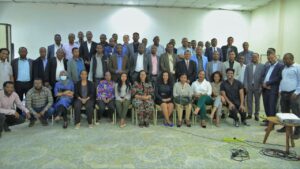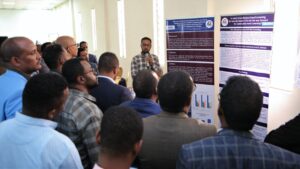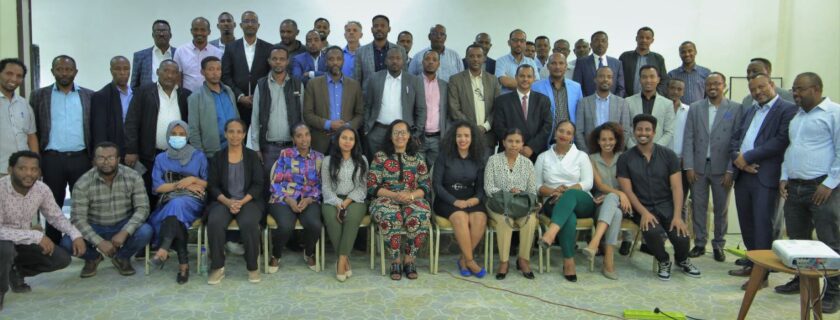The regional rounds of stakeholder engagements meetings on AHRI led research activities culminate with fruitful discussions in the southern region of Ethiopia.
The meeting which was hosted in Hawassa on March 3 and 4, 2023 brought together regional heath bureau heads, university leaders and health experts across the regions of SNNPR, Sidama and Benishangul-Gumuz.
At the meeting, Prof. Afework Kassu, AHRI- Director General, through his presentation titled, ‘AHRI’s Half-Century Health Research Journey, Contributions and Continued Focus In: Strengthening Health Research Development and Transition To A New Phase,’ shared insights on the Institute’s past, present and future focus and aspirations. Prof. Afework sensitized on the need of creating platforms to bridge the gap in health research which in turn lead to better informed decision making at the policy level. Likewise, he expressed that AHRI, is eager and open to work across the board with the regional states present, in line with the Institute’s mandate and research priorities.
During the meeting, AHRI’s senior researchers gave presentations and showcased posters on the various researches and projects being conducted by the Institute and highlighted areas of possible collaborations with the regions.
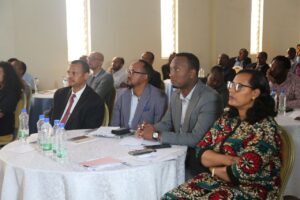
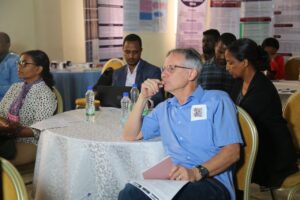
Similarly, representatives from the SNNPR Regional Health Bureau, Sidama National Regional State Health Bureau and Benishangul- Gumuz Regional Health Bureau shared their thematic health research priority areas.
The recurring thematic areas presented across the three regions included;
- Reproductive, Sexual, Maternal, Newborn and Child Health: i.e. Reproductive and Sexual Health, Neonatal care (new born care, asphyxia, perinatal death, perinatal infection, vaccination, Neonatal and childhood morbidity and mortality.
- Nutrition and Health: i.e. Nutrient intake and Nutritional Disorders, Feeding Practices, Development and Social Wellbeing, Maternal, Child Health Nutrition, Nutrition and Infection Diseases, Food Safety, Nutritional assessment and Growth monitoring, as well as multi-sectoral integration and coordination for effective implementation nutrition interventions
- Communicable and non-communicable diseases: i.e. Communicable disease such as; TB, and HIV/AIDS, Emerging and Re-emerging Infection Diseases(COVID-19), Vectors and Vector Borne Diseases(Malaria), Diarrheal disease (Rota) and other GIs prevalence and Determinant factors, Neglected Tropical Diseases (NTDs) (Oncocerciasis). Non-communicable disease, such as; common cardiac diseases, hypertension, diabetes mellitus, and common cancers as well as intervention strategies e.g. Psychological, Mental Health and Rehabilitative Services.
- Equitability and quality of health care: i.e. Factors affecting health care utilization quality, and equity, Client and staff satisfaction and efficiency of health systems, Continuous quality improvement/CQI for better health outcomes, Quality health care determinants at different health care facilities as well as capacity building (skills and knowledge of health experts).
- Medicines, Vaccines and Medical Technologies: i.e. Traditional and herbal medicine, Barriers to sustainable supply chain management system, and Vaccine potency.
- Health Systems and Policy: i.e. Health Inequality and Social Determinants of Health, Health Care Quality, Equity, and Stakeholders Interaction/Engagement, Health Care Transformation and Appropriate Technology, Health Sector Data: Source, Quality, Data use for Action and Sharing Mechanisms for Improvement in Service Delivery, as well as Health Ethics and Professionalism.
- Environmental and occupational Health and safety: i.e. Water, Sanitation, and Hygiene (WASH), Occupational Health and Safety (OHS), Food Hygiene, Infection Prevention and Control (IPC) and Housing and Institutional Health.
Following the presentations and priority summary, a plenary discussion was had where the various university heads and health experts expressed their readiness to work together in the future.
A visit was also made to the Hawassa University Comprehensive Specialized Hospital.
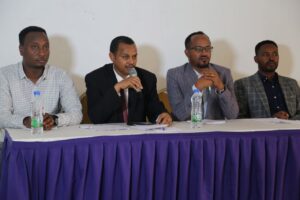
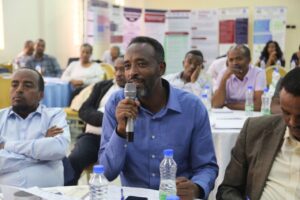
AHRI, having now covered all the regions across Ethiopia with regards to health related research, will now embark on the next step of working to integrate all the regions at the national level through appropriate stakeholder engagements.
